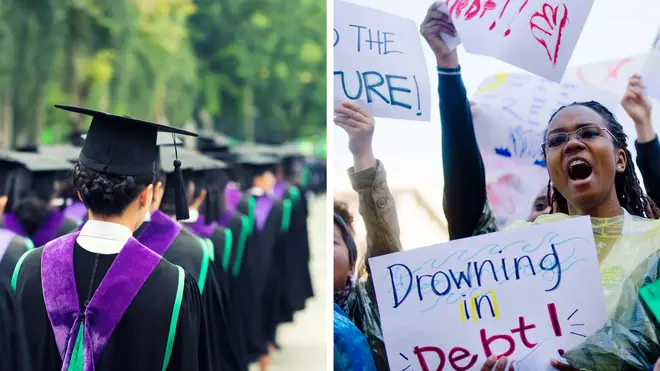
Richard Spurr 1am - 4am
27 September 2021, 23:15 | Updated: 27 September 2021, 23:18

The Government is reportedly planning to lower the salary level at which graduates start paying back their student loans.
Currently graduates begin paying back their loans - which are on average around £45,000 plus interest - when they earn £27,295 or more per year.
But ministers are thought to be considering reducing that figure, according to the Financial Times - a move that has been heavily criticised by experts.
Read more: Military on standby to tackle fuel crisis, Govt confirms
Read more: Eco protesters bring yet more chaos to the M25 in open defiance of Priti’s threats of jail
The University and College Union (UCU) accused the Government of "loading more debt onto students" and described the proposal as "regressive" - meaning it will take a larger proportion of income from low earners than high earners.
Jo Grady, general secretary of the UCU, said: "Loading more debt onto students is not the way to deal with the failed marketisation of higher education.
"It is a regressive move that will hit lower earners hardest, as they will see the largest relative increases to their payments.
"The Government should be looking at progressive taxes to publicly fund higher education."

Maajid Nawaz questions why students aren't 'up in arms' over fees
A report from the Institute of Fiscal Studies (IFS) warned that lowering the repayment threshold would hit graduates with average earnings the hardest.
"As a large majority of graduates will never pay off their student loans, lowering the repayment threshold to £23,000 is effectively a tax rise on graduates with middling earnings worth nearly £2 billion a year," said Ben Waltmann, senior research economist at the IFS.
Read more: Sabina Nessa: Man charged with murder of primary school teacher
Read more: Number of migrant crossings so far this year more than double figure for 2020
"Under this policy, a graduate earning £30,000 a year would have to pay around £400 more per year - on top of more than £500 more in National Insurance contributions under the plans for health and social care announced earlier this month (counting both employee and employer contributions).
"This would be a substantial burden especially on young graduates, who may be saving up for a deposit or starting a family."
Mr Waltmann called on ministers to instead raise revenue through an extension of the student loan repayment period or through the tax system.

Gov and Unis should consider reimbursing students
The Augar review of higher education in 2019 recommended the repayment threshold should be lowered to £23,000 and graduates should have to repay their student loans over 40 years rather than 30 years.
In January, the Government said that further reforms to the student finance system, including minimum entry requirements to universities, would be "considered" ahead of the next comprehensive spending review.
Hillary Gyebi-Ababio, vice president for higher education at the National Union Of Students (NUS), called the "injustice" of the move "astounding" when paired with the looming price hike in energy prices, adding that it followed "18 months of hardship".
"[The Government] should get their priorities right, end the marketisation of the higher education sector and scrap tuition fees," added Ms Gyebi-Ababio.
Read more: Ambulance driver bombarded with abuse on petrol station forecourt while filling up
Read more: How long could it take to fix the UK fuel crisis?
But Nick Hillman, director of the Higher Education Policy Institute (Hepi), said asking graduates to repay more of the costs would be more "manageable" than other options being considered to save money.
"My position is very clear. I do not think spending on education should be cut in a crisis," said Mr Hillman.
"However, as the Treasury clearly has higher education spending in its sights for the spending review, it is only responsible to consider which cuts could be catastrophic and which might be manageable.
"Hepi's research shows cutting the number of places just as the number of school leavers is growing so fast would be catastrophic, whereas asking graduates to repay more of the costs would be manageable. Unpalatable perhaps, but manageable."
Mr Hillman suggested that the Government is "belatedly" realising that the vocational options they want to drive people towards usually have lower earnings outcomes than degrees.
Mr Hillman said: "So they are now realising a lower earnings threshold is necessary to make their vocational reforms hold water. It is a very odd reason for making the change but there you go."
A Department for Education (DfE) spokesman said: "The student loan system is designed to ensure all those with the talent and desire to attend higher education are able to do so, whilst ensuring that the cost of higher education is fairly distributed between graduates and the taxpayer.
"We continue to consider the recommendations made by the Augar panel carefully alongside driving up quality of standards and educational excellence and ensuring a sustainable and flexible student finance system."